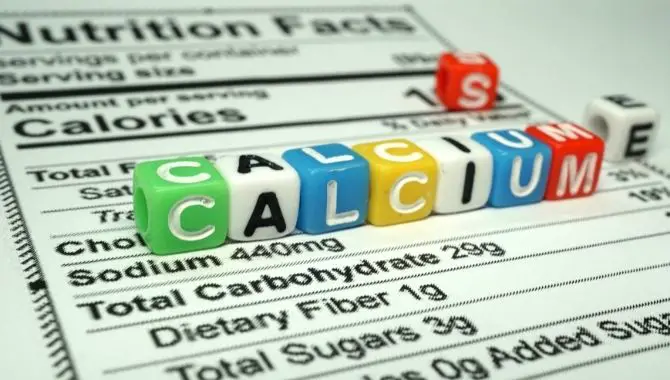When following a vegan diet, it’s important to read the ingredients list on every food package before purchase to ensure it is 100% vegan. But some ingredients can be quite tricky to spot because they are unfamiliar. This is especially true for ingredients used as additives in processed foods; these are not as easy to identify as the obvious no-no’s like milk, meat, and eggs. One common ingredient that you’re likely to come across on food packages is calcium propionate.
This ingredient is extensively used as an additive to help improve the volume, texture, and shelf life of a food product. It also contributes to a nutritional value in food products.
Is calcium propionate vegan? The simple answer is yes. Calcium propionate occurs naturally in some foods like cheeses and acts as a natural preservative. However, commercial calcium propionate, which is what is used as an additive in food products, is synthesized in a lab without the use of any animal-based ingredients and is, therefore, vegan-friendly.
With the increasing popularity of plant-based diets and veganism in general, consumers are increasingly demanding vegan-friendly foods. And, food manufacturers have no choice than to heed their demands. This has further driven the adoption of vegan additives like calcium propionate for different food applications.
Veganism is just like developing any other habit; it will get easier with time as ingredients and products in general, get more familiar. Today, I’m going to offer you everything you need to know about this ingredient so you can make an informed decision about adding it to your vegan diet. Without further ado, let’s get into it:
What Is Calcium Propionate And Is It Vegan?
Calcium propionate (calcium propanoate or E282) is a popular food additive used in the food industry mainly as a preservative. It occurs naturally in some foods where it acts as a preservative but today I’m talking about the commercial E282, which is industrially obtained from the reaction of neutralizing calcium hydroxide with propionic acid (propanoic acid). The compound occurs in either powder or crystalline form. It is highly soluble in water but very slightly soluble in alcohol.
E282 mainly functions as an inhibitor and has broad antibacterial activity against yeast and mould bacteria. It often inhibits the propagation of microorganisms, thus stopping mould and other bacterial growth in a number of food products.
Mould and bacterial growth are one of the most costly issues in the baking scene because baking provides favourable conditions for their growth. By prohibiting the growth of mould & other bacteria, calcium propionate is able to extend the shelf life of baked goods. This ingredient can help cut down on food spoilage and wastage, which will save you a lot of money, especially in large scale baking operations.
In addition to preserving food, calcium propionate is also a source of calcium and as such, contributes to the nutritional value of the food. Calcium is a very important mineral for the body as it promotes healthy teeth and bones, hormone and chemical regulation, nerve function, and even heart health.
Why It Is Vegan
The first thing that pops into people’s heads when they think of calcium is dairy products. This is because of the many years of milk advertising and how it is a great source of calcium.
It’s easy to see why vegans may be worried when they see an ingredient like calcium propionate listed on food products. For an ingredient to be considered vegan-friendly, it shouldn’t be sourced from animals or require the use of animal products or by-products in its production. Luckily, calcium propionate is synthetically formed in the lab by the reaction of calcium hydroxide with propionic acid. Both of these raw materials are manufactured without the use of any animal-derived products or matter. From this description, calcium propionate is, without a doubt, vegan-friendly.
Aside from the chemistry talk, E282 is vegan by the simple fact that it is used a preservative in many vegan products. You cannot say a food product is suitable for vegans and question one of the ingredients used to make it. In order for a food product to be certified as ‘vegan’, all the ingredients included in its creation must be vegan.
What Are The Uses Of Calcium Propionate?
This food additive has several applications in the food industry as highlighted below:
Bread and bakery products
Calcium Propionate is commonly added to bread and baked goods during the dough-mixing process because it helps to prevent mould growth, which would otherwise cause them to go bad, without interfering with its fermentation. While sodium propionate has the same preservation properties, it’s not recommended because it can delay the fermentation of yeast. In addition to preserving baked foods, E282 also enhances calcium nutrition in these foods.
Acts as a shelf-stable food additive
E282 is added in a lot of processed foods to prevent spoilage and extend shelf life. For starters, it can be used as a fungicide on fruits like grapefruits, lemons, oranges, and other citrus fruits. It’s also used in a lot of packaged food products where mould growth can occur. This includes in batter mixes, as well as processed nuts, fruits, and vegetables such as canned beans, canned fruits, soy sauce, nut butter, soups, dried or processed mushrooms, and mustard, just to name a few. Last, but not least, some beverages, including soft drinks, alcoholic drinks, and sports drinks also contain calcium propionate.
There are also a number of non-vegan foods that contain calcium propionate, including milk and dairy products, as well as processed meats. While E282 is vegan friendly, the presence of these animal-based products makes the entire food not vegan-friendly.
Beyond its role as a food additive, E282 finds some applications in non-food products, including the manufacture of butyl rubber. It is added to the raw material, which is rubber, to make it easier to process and prevent it from scorching during the manufacturing process. Cosmetics and personal care products are the other common non-food applications for calcium propionate.
Is Calcium Propionate Safe?
This food additive is generally recognised as safe and has been approved by several reputable health authorities, including the FDA (U.S. Food and Drug Administration), JECFA (The Joint FAO/WHO Expert Committee on Food Additives), as well as EFSA (European Food Safety Authority). It’s also worth noting that these reputable authorities have not put a maximum daily intake limit for calcium propionate, which means they generally consider it low-risk.
Some researchers, however, have speculated that E282 can cause migraines, allergies, diabetes, and autism, but there’s not enough scientific proof to support all that. Another study conducted in kids also found that they experienced restlessness, sleep issues, poor attention, and irritability from consuming bread with calcium propionate daily. But this doesn’t necessarily prove that it was the E282 that caused all this.
Others have described it as slightly toxic, although this is common for all artificial food additives. Plus, toxicity will require far large amounts of calcium propionate than what you can eat even if you consumed huge quantities of foods that contain it.
As mentioned earlier, your body doesn’t store calcium propionate; instead, it is broken down by the digestive system and readily absorbed, metabolised, and eliminated. This means that it won’t build up in your cells to cause any serious harm.
The Bottom Line
With the growing popularity of vegan foods, there’s always concern over unknown ingredient(s) lurking in plant-based foods that may prevent them from being 100% vegan. If you are a conscious vegan like me, you’ve probably seen calcium propionate on different food labels. And after reading this entire article, you now have a deeper understanding of this preservative, including the manufacturing process, its uses, safety issues, and more.
Calcium propionate is not only vegan but also safe for consumption. Therefore, if you find it listed in otherwise vegan foods, you can consume the food without any vegan guilt or causing harm to your body.
The truth is there isn’t much scientific evidence providing a definitive connection between calcium propionate and the speculated health risks. This is not to say they are impossible though. If you think calcium propionate might be causing you issues, consult with your healthcare provider.
Welcome to VeganClue - My name is Robert Van De Ville and together with my team we spent hundreds of hours researching the most relevant topics for Vegans and non yet Vegans. Are you looking for more information about Veganism, animal welfare, diet, health, and environmental benefits of the Vegan lifestyle? You are in the right place! Enjoy the site.

